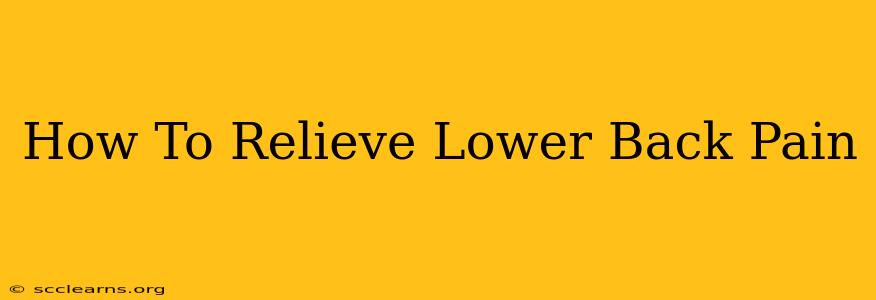Lower back pain is a common ailment affecting millions worldwide. It can range from a mild ache to a debilitating condition, significantly impacting daily life. This comprehensive guide explores various methods to relieve lower back pain, from simple home remedies to professional medical treatments. Understanding the causes and implementing effective strategies can significantly improve your comfort and well-being.
Understanding the Causes of Lower Back Pain
Before diving into solutions, it's crucial to understand the potential sources of your lower back pain. While the exact cause isn't always clear, several factors can contribute:
- Muscle Strains and Sprains: These are often caused by sudden movements, lifting heavy objects incorrectly, or overuse. They are characterized by pain, stiffness, and limited range of motion.
- Degenerative Disc Disease: As we age, the discs between our vertebrae can degenerate, leading to pain and stiffness.
- Sciatica: This involves irritation or compression of the sciatic nerve, causing pain that radiates down the leg.
- Spinal Stenosis: Narrowing of the spinal canal can put pressure on nerves, resulting in lower back pain and leg pain.
- Poor Posture: Slouching or maintaining incorrect posture for extended periods can strain back muscles and lead to chronic pain.
- Obesity: Excess weight puts added stress on the lower back.
- Osteoarthritis: This degenerative joint disease can affect the spine, causing pain and stiffness.
Effective Ways to Relieve Lower Back Pain
The best approach to relieving lower back pain depends on its cause and severity. Here are some effective strategies:
Home Remedies and Self-Care
- Rest: Avoid strenuous activities that aggravate your pain. Gentle movement is encouraged, but avoid overexertion.
- Ice and Heat: Apply ice packs for the first 24-48 hours to reduce inflammation. Afterward, switch to heat packs to relax muscles. Alternate between ice and heat as needed.
- Over-the-Counter Medications: Pain relievers like ibuprofen or acetaminophen can help manage pain and inflammation. Always follow dosage instructions.
- Gentle Stretching and Exercise: Light exercises like walking, yoga, and swimming can strengthen your back muscles and improve flexibility. Avoid exercises that worsen your pain. Consult a physical therapist for a personalized exercise plan.
- Maintain Good Posture: Pay attention to your posture throughout the day. Sit upright with proper lumbar support and avoid slouching.
- Ergonomic Adjustments: Ensure your workstation is ergonomically sound to minimize strain on your back.
- Lose Weight: If you are overweight or obese, losing weight can significantly reduce the strain on your lower back.
Medical Treatments
For more severe or persistent lower back pain, medical interventions may be necessary:
- Physical Therapy: A physical therapist can provide targeted exercises and stretches to strengthen your back muscles and improve flexibility.
- Chiropractic Care: Chiropractors use spinal manipulation to address misalignments and improve joint function.
- Massage Therapy: Massage can help relax tense muscles and improve blood flow, reducing pain and stiffness.
- Injections: Corticosteroid injections can reduce inflammation and pain in the short term.
- Surgery: In rare cases, surgery may be necessary to address underlying structural problems.
When to See a Doctor
It's essential to seek medical attention if your lower back pain:
- Is severe or debilitating.
- Is accompanied by numbness, tingling, or weakness in your legs.
- Is accompanied by fever or unexplained weight loss.
- Does not improve after a few weeks of home treatment.
- Radiates to your legs or buttocks.
Preventing Lower Back Pain
Preventing lower back pain is crucial for long-term well-being. Consider these preventative measures:
- Maintain a healthy weight.
- Exercise regularly.
- Practice good posture.
- Use proper lifting techniques.
- Take regular breaks from prolonged sitting.
- Strengthen your core muscles.
By understanding the causes of lower back pain and implementing the appropriate strategies, you can effectively manage your pain and improve your overall quality of life. Remember to consult with your doctor or a healthcare professional for personalized advice and treatment. Don't let lower back pain control you – take proactive steps to regain comfort and mobility.

